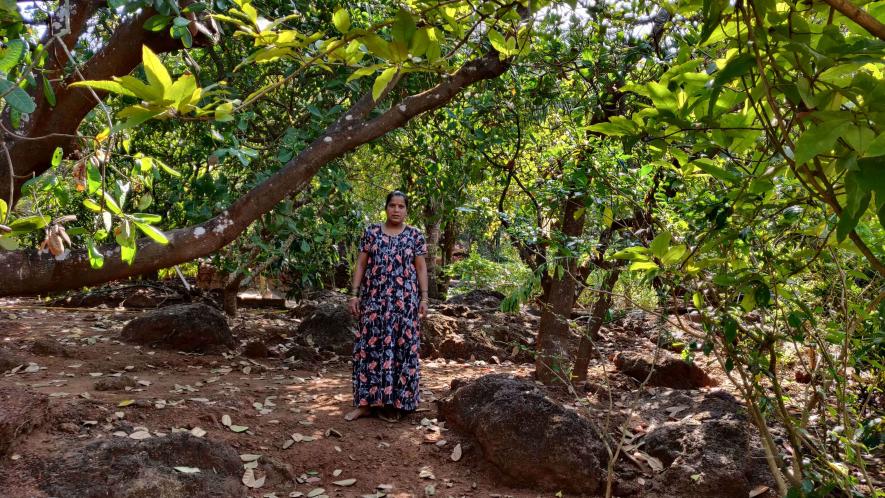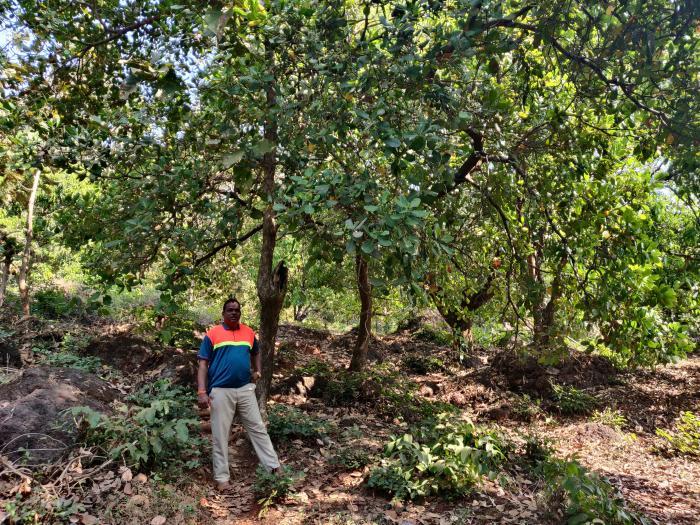Climate Change Affecting Cashew Nut Production in India

Rutuja Markar whose cashewnut trees got bud break late tell cashew nuts provides them livelihood. But climate change is affecting their income.
Unexpected changes in weather like cyclones and heavy rainfall events have been affecting the production of cashew nut in India. While no study has been done on the matter, experts put it down to climate change.
Ravindra Bhagat, a 40-year-old farmer who has taken up a half-acre cashew nut farm at the Kolamb Gram Panchayat in Ratnagiri district, has 40 trees. Bhagat, who took up the land five years ago, said that flowering began in January this year. “Generally, flowering begins in October-November with the onset of winter. This year however, winter started in January; the timetable has changed,” he said, mentioning that he harvests between 60-70 kilograms of cashew.

Ravindra Bhagat from Kolamb village tells his cashewnut trees are yet to see flowering.
“I don’t know how much loss I will have to bear,” he added, explaining that he turned to the cashew nut crop about five years ago to make more money.
Like Ravindra, cashew nut farmers have been worried due to late or no flowering of cashew trees this year. The Konkan region, which comprises five districts of Maharashtra, namely Ratnagiri, Sindhudurga, Raigad, Thane and Palghar produces 25% of the total cashew production of India.
Dr. Bharat Salvi, head of the Department of Horticulture, College of Agriculture in Ratnagiri says that two cyclones, excessive rainfall during monsoon and a delay in the onset of winter have caused cashew nut trees to not get flowers in time. “The beginning of bud break requires dry and cold weather for 10-15 days. However it was raining in the first week of November. And later, the temperature did not drop till January,” he said.
Salvi said that the cashew yield is between 700 and 1200 tonnes per hectare. “Delayed flowering will affect quantity and quality of cashew nuts and that will affect the income of farmers,” he said.
As per the India Meteorological Department (IMD), the Konkan region received 500mm of rainfall this year which got extended till November. However the area generally receives 3500 mm rain between June and September.
India production of cashewnut
| Year | Area under cultivation | Production |
|---|---|---|
| 2017-18 | 1062.04 thousands hectares | 8.17 lakh metric tonnes |
| 2018-19 | 1174 thousands hectares | 7.42 lakh metric tonnes |
Maharashtra figures
| Year | Area under cultivation | Production |
|---|---|---|
| 2017-18 | 191.45 thousands hectares | 2.69 lakh metric tonnes |
| 2018-19 | 191.45 thousands hectares | 2.156 lakh metric tonnes |
Dr. Venkatesh N. Hubballi, Director of Directorate of Cashew nut and Cocoa Development, a wing of the Agriculture Ministry of India said that cashew nut production was 9% lower in 2018-19 as compared to 2017-18, adding that it is expected to be 10% lower this year due to changes in weather. “Various cyclones have hit the east and west coast over the last two years. Untimely rain in states that produces cashew nut- Maharashtra, Odisha, Karnataka, Andhra Pradesh, Kerala and Goa, is affecting production,” he added.
It is estimated that the Konkan region in Maharashtra exports about 15% of Indian cashews worth Rs 370 crore.
Rutuja Markar, a 50-year-old farmer from Ratnagiri has 15 cashew nut trees at her house and is worried due to the late flowering of trees. “I have one acre of farmland where I stay and get between 30 and 50 kilograms of cashew nuts,” she said. Many marginal farmers like Markar have turned towards cashew as it is a cash crop.
One of the experts from the Directorate of Cashew nut and Cocoa Development said on the condition of anonymity the Tea Mosquito Bug is causing damage to cashew nut flowering. “Cloudy and humid weather due to heavy rain caused this pest to spread. Due to excessive rain this year, cashew nut plantations in Andhra Pradesh and Odisha has been affected by this pest,” he said.
Guruprasad Pawar, who runs a cashew nut processing unit in Ratnagiri, accepted that the production of cashew nuts has gone down. “Production of cashew nuts has gone down as we struggle to keep running processing units throughout the year. We also end up importing cashew nuts from African countries. And, due to the state government’s neglect, many units are on the verge of closing down,” he said. Pawar mentions that farmers sell their produce to processing units in Cochin, which is the hub of processing units in India.
Experts point to a few studies which have shown how changes in the weather affects production of cashew. However, a detailed study is required to understand how climate change is affecting its production, and consequently, the livelihoods of farmers as well.
Get the latest reports & analysis with people's perspective on Protests, movements & deep analytical videos, discussions of the current affairs in your Telegram app. Subscribe to NewsClick's Telegram channel & get Real-Time updates on stories, as they get published on our website.














